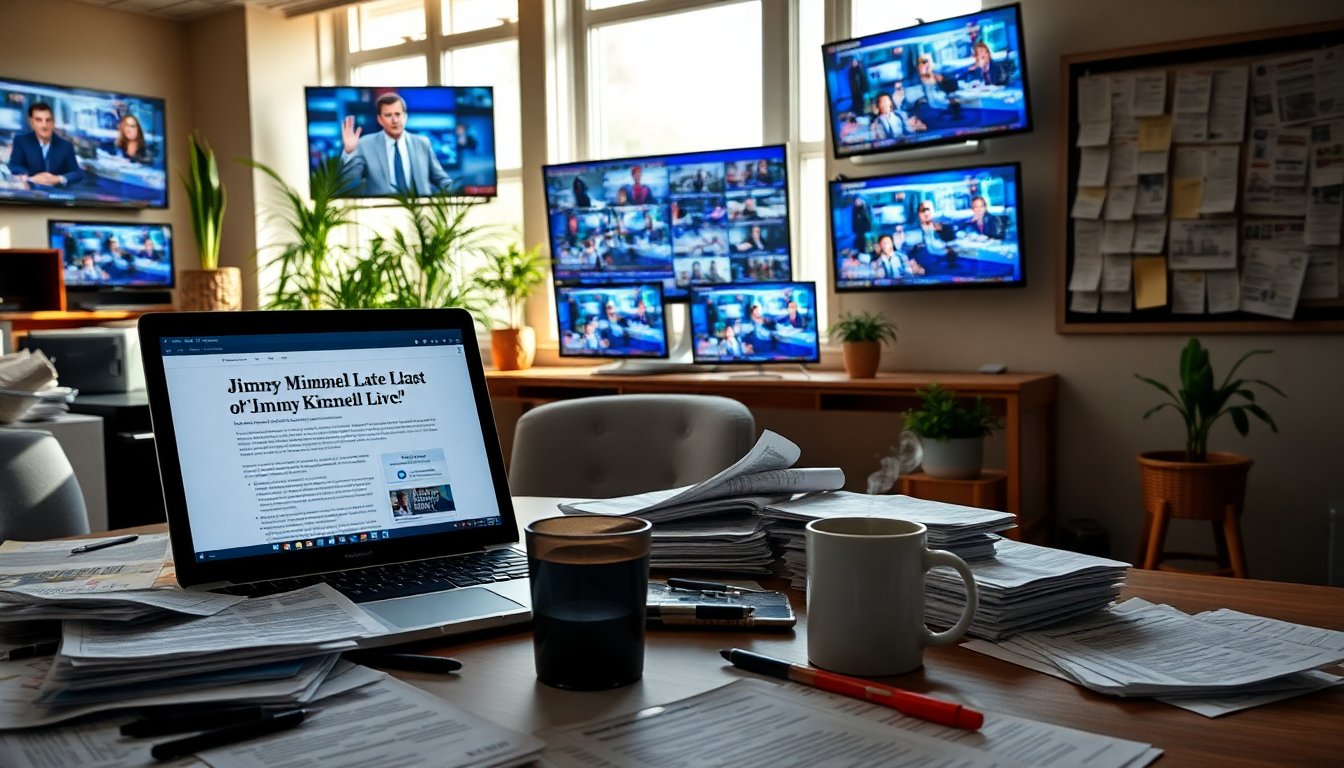Table of Contents
In a significant development, ABC has announced the indefinite suspension of new episodes of Jimmy Kimmel Live!<\/strong>, sparking extensive debate within the media community. This decision follows controversial remarks made by host Jimmy Kimmel<\/strong>, which various conservative commentators deemed insensitive<\/em> in light of the recent tragic shooting involving activist Charlie Kirk.<\/p>
Former President Donald Trump publicly supported ABC’s decision, branding the show as ratings-challenged<\/strong> and commending the network for its bold stance. In a post on Truth Social, Trump criticized Kimmel’s talent<\/strong> and urged action against other late-night television hosts.<\/p>
Understanding the Backlash Against Kimmel<\/h2>
The controversy began during a recent episode of Kimmel’s monologue. He made remarks regarding Tyler Robinson, the alleged shooter of Kirk, while also criticizing the response of the MAGA movement. Many perceived his comments as an attempt to minimize the gravity of the situation, which sparked significant backlash from conservative groups.
In light of growing viewer complaints, Nexstar Media, a prominent television station owner in the United States, announced plans to preempt Kimmel’s show. This decision prompted ABC to intervene, resulting in the suspension of the program as they addressed the complex landscape of public sentiment and corporate accountability.
The Reaction from Media and Political Figures
Reactions to ABC’s cancellation have been immediate and diverse. Prominent figures, including actor Ben Stiller, expressed their dissatisfaction, labeling the decision as censorship. Likewise, MSNBC host Chris Hayes characterized it as a direct assault on free speech, highlighting the troubling precedent it establishes when media companies yield to political pressures.
California Governor Gavin Newsom shared these views, accusing the Republican Party of weakening free speech. He argued that their actions reflect a broader trend of censorship. Newsom cited instances such as controlling media narratives, dismissing dissenting voices, and canceling programs as part of a coordinated effort that threatens the very foundations of free speech in the United States.
The Impact of Regulatory Pressure
During recent developments, Federal Communications Commission (FCC) Chairman Brendan Carr<\/strong> issued a warning of potential regulatory measures against ABC if the network failed to address ongoing concerns. Following the cancellation of Jimmy Kimmel’s show, Carr acknowledged Nexstar’s involvement, emphasizing the obligation of local broadcasters to prioritize the public interest.<\/p>
Carr’s remarks underscore the intricate dynamics between media entities and regulatory agencies, particularly in response to public outcry. This situation prompts critical discussions around the need to balance editorial freedom<\/strong> with audience accountability, a challenge that many networks currently encounter.<\/p>
Insights on Media and Free Speech<\/h3>
Impact of Recent Events on Free Speech in Entertainment
The consequences of recent events extend beyond Jimmy Kimmel’s show, igniting a broader discussion about the state of free speech within the entertainment industry. As various individuals and organizations voice concerns over censorship, networks face a crucial challenge: how can they balance creative expression with their accountability to audiences?
This situation marks a pivotal moment for media companies, particularly regarding their response to the shifting landscape of public opinion and political influence. The demand for heightened accountability and responsiveness to public sentiment may redefine the operational dynamics of late-night shows in the future.
Future of Jimmy Kimmel Live! Remains Uncertain
As the controversy surrounding Jimmy Kimmel Live!<\/strong> unfolds, the program’s future is in jeopardy. ABC faces a pivotal decision: will they reinstate the show, or does this cancellation signal a change in the late-night television landscape? The coming weeks will be crucial as audiences reflect on the implications of such decisions for their freedom of expression.
The dialogue surrounding Kimmel’s comments and ABC’s subsequent actions highlights the ongoing tensions between media, politics, and the public’s demand for a variety of voices in the national conversation.


